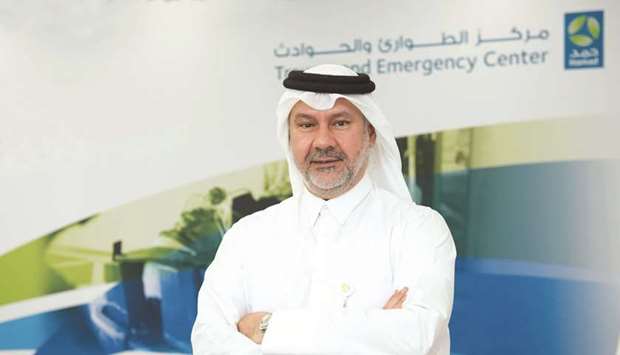Qatar has made great progress in the treatment of children with hereditary spinal muscular atrophy after Hamad General Hospital began using the latest innovative gene therapy, which has emerged globally to treat these conditions.
On Monday, a team of doctors at Hamad General Hospital administered the innovative gene therapy to two paediatric patients diagnosed with the congenital disease.
A single dose of the new medication was injected into each patient and will be followed by a prescribed therapeutic plan, as per the internationally approved protocol.
Hamad Medical Corporation (HMC) has become the second healthcare organisation outside the United States and Canada to treat children with congenital spinal muscular atrophy using a new gene therapy, which is said to cost $2.1mn a dose and is being provided to paediatric patients in Qatar free of charge.
Commenting on the new gene therapy being available to patients in Qatar, acting Chief Medical Officer at HMC Dr Abdulla al-Ansari said: “The application of this new gene therapy only six months after its approval by the Food and Drug Administration (FDA) in the US reiterates HMC’s resolve and commitment to making the latest and most effective medications available to patients.”
Dr al-Ansari praised Qatar for the ongoing support of the healthcare sector and enabling HMC to provide its patients with the medications they need, regardless of cost.
“We wish a speedy recovery to these children. I would like to highlight the efforts of HMC’s clinical teams who provide care for, and treatment of, all patients with this condition. In the past, we have provided spinal muscular atrophy patients with the latest treatment available. The cost of that medication was QR500,000 per dose, and each patient required several doses. With the emergence of this new drug, which was approved by the FDA only six months ago, we immediately sought to obtain it for the benefit of our patients, despite its high price. HMC will always put its patients first and will always remain committed to providing them with the best and latest treatments,” added Dr al-Ansari.
He thanked HMC’s management and all clinical, nursing, and administrative teams for their efforts and continued commitment to delivering the safest, most effective, and compassionate healthcare to all patients.
Senior Consultant, Paediatrics, and Head of Clinical and Metabolic Genetics, Dr Tawfeg Ben-Omran, said HMC becoming the second centre outside North America to offer the innovative therapy is a significant achievement.
“Spinal muscular atrophy (SMA) is a genetic disorder and a leading cause of death in children under two years of age. The disease is characterised by weakness and atrophy in the muscles used for movement, breathing, and swallowing. Spinal muscular atrophy can be prevented through premarital screening and genetic testing before commencing IVF treatment for couples with a family history of the condition,” said Dr Ben-Omran.
“This highly advanced treatment involves the one-time intravenous administration of a healthy and functional gene which is delivered by a vector (a vehicle for delivering genetic material) to target the cause of SMA. The gene therapy improves the response of the child’s motor neurons. Dosage of treatment is determined based on the child’s weight,” added Dr Ben-Omran.
Dr Abdullah al-Houthi, Deputy Chief, Paediatrics Department, Hamad General Hospital, said Qatar is one of the few countries in the world to use the innovative gene therapy.
“This morning, in the Paediatric Intensive Care Unit (PICU) at Hamad General Hospital, we administered the first dose of the innovative gene therapy to children with spinal muscular atrophy. The first dose was injected by a team that included Dr Khaled al-Laithy, Head of the Paediatric Intensive Care Unit at Hamad General Hospital and Dr Husam Ali, Clinical Pharmacist. Both patients are currently undergoing observation in the PICU. This time of careful observation will be followed by a prescribed treatment plan,” said Dr al-Houthi.
Dr al-Laithy said that the proper dose of gene therapy has been successfully administered to two patients, noting the patients are 17 and 18 months old. Prior to the introduction of the new gene therapy, the two patients had been treated with repetitive spinal injections, a cumbersome procedure, but the new therapy is thought to be safer and more effective in the management of the disease.
“The new gene therapy, which is prescribed to paediatric patients under the age of two years old, will be administered to three more patients at HMC in the near future. A full clinical assessment of these patients will be conducted before the gene therapy procedure to ensure the treatment is safe and appropriate for the patients. Healthcare professionals at HMCs PICU are capable of administering the new medication and undertaking the necessary follow-up care,” added Dr al-Laithy.

Dr Abdulla al-Ansari
